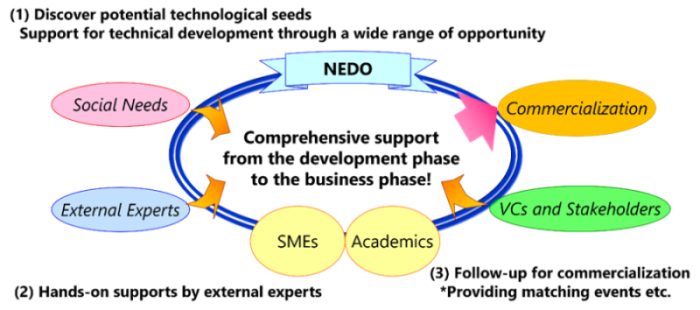Research and Development on New Energy Technology for Discovering Technology Seeds and Commercializing Developed Technologies
Project overview
With a focus on promoting the use of renewable energy sources, whose importance is indicated in “The Strategic Energy Plan” and “The New Growth Strategy”, this program provides R&D funding in two areas: 1. Support for new energy small and medium-sized enterprises (SMEs)/startups and 2. Demonstrations of far-sighted new energy technologies. By funding R&D and supporting the development of SMEs/startups under these two areas, NEDO seeks to diversify technology options and promote innovation in the new energy sector.
This program is also intended, in connection with the promotion of “Fukushima Innovation Coast” concept, to contribute to the reconstruction and revitalization of the Coastal Region of Fukushima Prefecture by enhancing support for technology development in renewable energy fields.
-
 Program Overview
Program Overview
Research and Development Details
Program Scheme
NEDO announces a public offer and provides R&D funding supports in the two areas; "Development of new energy SMEs/startups" and "Demonstrations of Future Oriented new energy technologies". In addition, the program utilizes the Stage-Gate review, which is a step-by-step review method to determine whether a project can move to the next phase or not, with the aim of providing continuous support for outstanding R&D themes.
The adoption of “Demonstration of Future Oriented New Energy Technologies” is determined through the Public Offer without the Stage-Gate reviewing process.
[1] Support for New Energy SMEs/Startups
Consistent with the level of progress of their R&D efforts and plans for commercialization, NEDO provides R&D funding according to the following five phases.
Phase A: Feasibility Study
Support for the feasibility studies on fundamental technologies needed for commercialization by SMEs/start-ups with technology seeds, as the collaboration among industry, academia and government.
- Project period: up to 1 year
- Project amount: up to 12.5 million yen per theme in principle
- Subsidy amount and rate: up to 10 million yen per theme, with NEDO supporting up to 8/10 of total cost.
Phase B: Fundamental Research
Support for the R&D on fundamental technologies needed for commercialization by SMEs/start-ups with technology seeds, as the collaboration among industry, academia and government.
- Project period: up to 2 years in principle
- Project amount: Up to 62.5 million yen per theme in principle
- Subsidy amount and rate: Up to 50 million yen per theme, with NEDO supporting up to 8/10 of total cost.
Phase α: Feasibility Study
Support for the feasibility studies on fundamental technologies needed for commercialization by SMEs/start-ups with technology seeds with obtaining the funding by the domestic venture capitalists or seed accelerators (hereinafter referred to as “VCs”).
- Project period: up to 1 year
- Project amount: Up to 15 million yen per theme in principle
- Subsidy amount and rate: Up to 10 million yen per theme, with NEDO supporting up to 2/3 of total cost.
Phase β: Fundamental Research
Support for the improvement of reliability and quality on their constituent technologies, R&D on fundamental technologies for optimizing of system design, manufacturing the prototype and evaluation for commercialization by SMEs/start-ups with technology seeds with obtaining the funds by the VCs.
- Project period: up to 2 years in principle
- Project amount: Up to 105 million yen per theme in principle
- Subsidy amount and rate: Up to 70 million yen per theme, with NEDO supporting up to 2/3 of total cost.
Phase C: R&D on Commercial Applications
Support for R&D and demonstration of practical application technologies by SMEs/start-ups with fundamental technology elements that have high potential for commercialization.
- Project period: up to 2 years in principle
- Project amount: Up to 225 million yen per theme in principle
- Subsidy amount and rate: Up to 150 million yen per theme, with NEDO supporting up to 2/3 of total cost.
[2] Demonstration of Future Oriented New Energy Technologies Program
Conduct the demonstration progress for clarifying appointed tasks, such as, power generation cost reduction, location restriction solving, long term stable power supplying, coexistence with local renewable energy and others.
- Project period: up to 1 year (preparation); up to 3 years in principle (demonstration)
- Project amount: Up to 40 million yen per theme; Up to 30 million yen for SMEs in principle (preparation)
- Up to 600 million yen per theme; up to 450 million yen for SMEs in principle (demonstration)
- Subsidy amount and rate: Up to 20 million yen for preparation (up to 300 million yen for demonstration) per theme, with NEDO supporting up to 1/2 of total cost; up to 2/3 of total cost for SMEs.
Basic information
| Technical field | Cross-sectoral proposal-based programs |
|---|---|
| Project code | P10020 |
| Department in charge | Renewable Energy Department |
Last Updated : April 8, 2025
